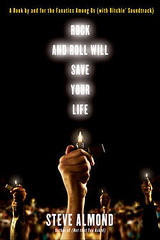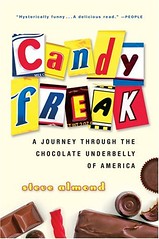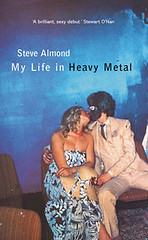Interview: Steve Almond of How Rock and Roll Will Save Your Life (Part 1)
Kyle Bylin, Associate Editor — (@kbylin) — Read Part 2
Recently, I spoke with Steve Almond, who is the author of the story collections My Life in Heavy Metal and The Evil B.B. Chow, the novel Which Brings Me to You (with Julianna Baggott), and the non-fiction books Candyfreak and (Not That You Asked). His new book, Rock and Roll Will Save Your Life, just came out and it's awesome. In this interview, Steve talks about Drooling Fanaticism, the mystery that's essential to rock stars, and the Myth of the Starving Artist.
In your new book, you explore your personal history as a “Drooling Fanatic” and provide a great deal of insight into the upper tiers of music fandom. Could you give an overview of the characteristics of a DF?
Steve Almond: The symptomalogy is really varied, but some pretty safe bets would be: Having way more albums than the people around you think is normal or healthy; an evangelical devotion to your favorite bands, and an incessant need to spread their gospel until such as time as they become popular, at which point you get really resentful that they’ve “sold out” ; referring to your favorite musicians by their first names, as if they’re friends of yours. (Note: they aren’t); and needing music to reach the feelings inside you that are inaccessible by other means.
More details are here.
You touch briefly on this notion: that the real reason people lament about the death of the vinyl LP as a medium is that they are concerned, not about the loss of the medium itself, but of the loss of the concerted sonic experience. Noting that “Drooling Fanaticism” boils down to giving music this degree of undivided attention, this level of scrutiny, and, yes, that many repeat listening sessions.
To some extent, do you think that, due to the beckoning of Modern Warfare 2 and constant barrage of Facebook IMs, this particular attention to music has been lost among those who were born digital?
Steve Almond: No. I still think there are plenty of people who listen to music super intently. No one generation has the franchise on that kind of focused attention. I will say, though, that one of the radical conditions of life in the digital age is the constant possibility of distraction. Technology has created some amazing innovations when it comes to music. I mean, if you’d showed me the iPod when I was fourteen years old, I would have declared you the messiah. But at a certain point all that convenience flows in the direction of spiritual indolence.
If you can have everything you want the second you want it, if your desire has no chance to marinade, everything becomes a bit less sacred. To put it more plainly: I sort of miss the days when I had to listen to the radio for two hours to hear the DJ at KFRC play my favorite song (“Undercover Angel”). Why? Because it felt like my prayers were being answered.
For those who came of age in the culture of MTV and commercial radio and have formed an innate preference towards their music, I wonder if the music they’re biased towards offers the same kinds of rewards that helped foster your devotion to artists and fueled your lifelong journey as a “Drooling Fanatic.”
Do you think that part of the reason you were able to give your music such undivided attention is because a majority of the songs in that era consisted of the kind of musical and lyrical complexity that rewarded that deep of “Drooling Fanaticism?”
Steve Almond: Honestly, there’s been dopey music and great music made in every era. And for the most part, the popular stuff has been the least complicated and nuanced. That’s just how American culture operates. It selects for stuff that’s familiar and comforting, over stuff that’s complex and painful. Doesn’t matter if it’s music or books or movies.
If anything, the message that I want folks to take away from the book is that there are still so many remarkable musicians out there right now making truly incredible, life-saving noise. And they don’t have to take my word for it. The book comes with a soundtrack, so folks can judge for themselves.
You make an interesting assertion about how, in the mind of a Drooling Fanatic, it is not enough to simply enjoy these musicians, that there’s this deep-seeded need within them that drives them to share the music they are infatuated with. Not solely because they feel the need to share the music itself, but because they want someone else to feel what they felt inside, when they hear the song.
How did this the act of sharing become what you called “a solution to the crisis of [your] loneliness?
Steve Almond: I just think that music is the thing that allows me to experience all the big, turbulent emotions inside me. And when I push a song on someone else, what I really want, deep down, is for them to feel those same emotions, so I don’t have to feel alone with them. I can try to give you a more hopeful example, which would be the first night I hung out with my wife. I made her a nice meal and gave her some wine and then I turned down the lights and played her a bunch of Joe Henry. At a certain point we got to slow dancing and she murmured, “What is this music? It’s so fantastic.” And this was, of course, exactly what I wanted: for her to feel the same way I do when I listen to Joe Henry: relaxed and happy and sexually awakened.
Get In Touch:
- kyledotbylinatgmaildotcom



Wicked damn interesting reading, thank you. Really refreshing break from the usual business drivel we all talk about, I like this guy’s angle.
And when I push a song on someone else, what I really want, deep down, is for them to feel those same emotions, so I don’t have to feel alone with them.
I can understand this reason for being a fan. But I have wondered, as technology advances and we feel more empowered ourselves, if there are going to be fewer fans, especially hardcore music fans.
Being a fan usually means focusing on what someone else does rather than on your own creations. Those fans who build their lives around certain bands or musicians tend to be perceived, even if not true, as having lives that aren’t meaningful enough, or busy enough, or fulfilling enough to give them something to do. I mean, if you are busy building a company or raising a family or doing your own stuff on the weekends, you don’t have the time to be slavishly following a band or artist.
I’ve been around athletes and musicians who have hardcore fans and while sometimes they are grateful for these fans, other times they find them weird.
I can see hardcore fandom continuing among teenagers. They haven’t yet figured out what they can do, so being a fan may be their only way to connect and gain some sort of status.
But once people becomes adults and find out it’s fun to get attention for what they personally do, do they want to continue to define themselves primarily as hardcore fans?
To paraphrase an expression, “Those who can, do. Those who can’t, teach.” Or those who can’t, critique. Or those who can’t, idol worship.
I would be excited to read this based on much of what he says in this interview; it’s just that the “drooling fanatic” tag immediately brought to mind an article of Almond’s in an airline magazine, about his attempt to interview Dave Grohl. That “drooling fanatacism” angle seems like such a lame device to attract non-music fans, such as airline readers and the editors of airline magazines, to read his writing, which can be more nuanced. I just kept picturing fat guys with neckties around their heads, playing air guitar, and relating to the author.